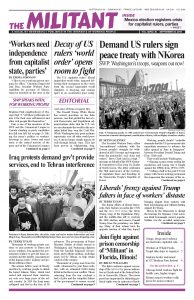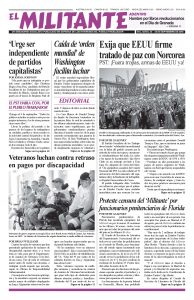Talk of the need for a union among retail workers is in the air. Workers are getting fed up with low wages, speedup, threats of layoffs and abusive work schedules. And the expansion in the capitalist economy means workers are feeling more confident in seeking changes in pay and conditions.
Despite Whole Foods being on Fortune magazine’s “Best Employers to Work for” list for 20 years in a row, workers at the company — bought by Amazon a year ago — are among those looking to get a union.
Whole Foods has more than 89,000 employees at 470 U.S. stores in 42 states, as well as 20 stores in Canada and the United Kingdom.
A group of workers calling themselves Team WFM’s Cross Regional Committee sent out an email letter to co-workers around the country Sept. 6 asking them to join in organizing “to force Amazon to meet our demands.”
“Accomplishing this as individual stores is extremely difficult,” the letter says. “If we organize our efforts on a national scale it will be impossible for Amazon and WFM executives to ignore.” Their effort is being backed by the Retail, Wholesale and Department Store Union.
The letter says that Amazon has been combining jobs at Whole Foods stores to cut labor costs, something that will sound familiar to workers at Walmart and other retail giants. Among the workers’ demands are “a $15 minimum wage, 401(k) matching, paid maternity leave, lower health insurance deductibles” and “equal profit sharing.”
Amazon issued a statement saying Whole Foods workers should “bring their comments, questions and concerns directly to their management team” instead of joining a union.
Other bosses are paying close attention. Seattle-based Amazon, is the second-largest private company in the U.S., after Walmart, with 575,000 workers. Many work in Amazon’s warehouses, where they are continuously timed and monitored to push them to work faster and faster. Articles on the organizing initiative appeared in the Wall Street Journal, Fortune, and the Supermarketnews.com website.
Amazon’s top boss, Jeff Bezos, is currently the richest person in the world, sitting on $112 billion, according to Forbes magazine, which keeps track of such things. And, Forbes says, if you add together the loot owned by Jim, Robert and Alice Walton, the scions of the Walmart empire, you have a few bucks over $138 billion.
Some 200 workers at Target in Huntington Station in Long Island, New York, voted Sept. 7-8 on joining United Food and Commercial Workers Local 1500.
“They called us. This is not a case when we sent union organizers,” Local 1500 President Tony Speelman told New York Newsday.
Target Corp. employs 350,000 people in 1,839 stores, but none have a union. The company tried to block the vote, but failed.
The Dayton family, whose ancestors founded the company, can’t hold a candle to Bezos and the Waltons. Forbes says they’re worth a measly $1.6 billion.
After a union-organizing drive forced a vote at its store in nearby Valley Stream in 2011, Target bosses shut down the store for “renovations” and dispersed workers to other stores, even though the company won the vote.
Target bosses say workers at Huntington Station voted 118-39 against joining Local 1500, but the fight for a union won’t go away.
Meanwhile, Walmart workers won a victory earlier in the year, forcing the company to recognize their right to wear pro-union insignia on their clothes at work.
The May agreement, signed by Walmart, OUR Walmart and the National Labor Relations Board, stems from the retail giant’s anti-union actions after workers went on strike at its Richmond, California, store in 2012. The company also agreed to stop threatening to fire workers who support strikes or union-organizing efforts.

